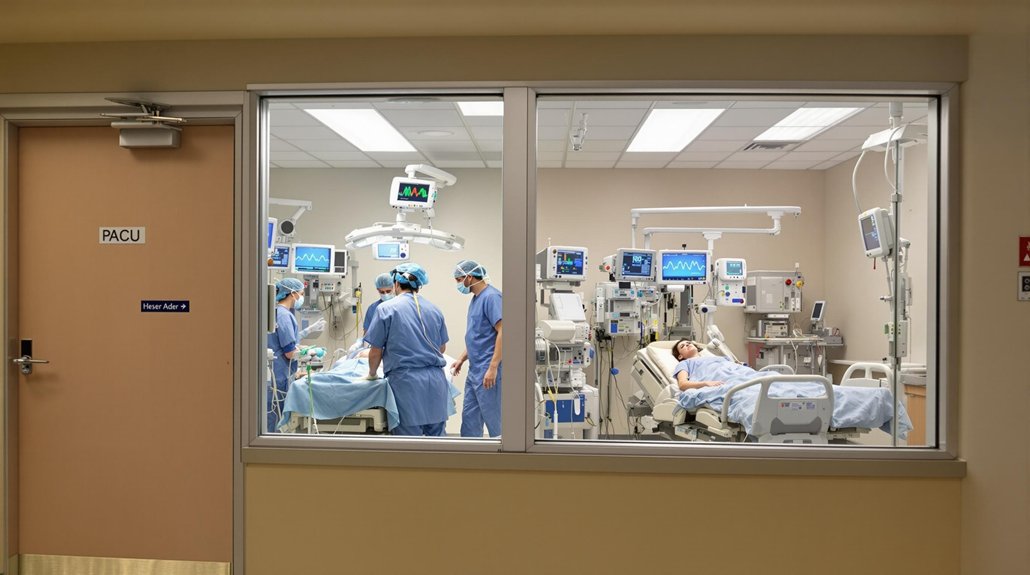Preoperative care involves all the medical steps you’ll take before surgery to guarantee you’re physically and mentally ready for your procedure. You’ll undergo health assessments, lab tests, and medical history reviews while receiving detailed instructions about medications, fasting, and lifestyle changes. Your healthcare team will monitor your essential signs, manage your medications, and provide emotional support throughout the process. Understanding each aspect of preoperative care can greatly improve your surgical outcome.
The Foundations of Preoperative Care
While surgery can be intimidating, preoperative care forms the essential groundwork for successful surgical outcomes. This important preparation phase guarantees you’re physically and mentally ready for your procedure while minimizing potential risks.
At its core, preoperative care relies on effective preoperative communication between you, your healthcare team, and your loved ones. You’ll participate in thorough health assessments, including critical signs monitoring, laboratory tests, and medical history reviews.
Patient involvement is important – you’ll discuss your medications, allergies, and previous surgeries with your care team.
You’ll also receive detailed instructions about fasting requirements, medication adjustments, and lifestyle modifications needed before surgery. Understanding and following these guidelines helps prevent complications and promotes ideal healing, making you an active partner in your surgical journey.
Our dedicated team provides emotional and family support through counseling and education to help reduce anxiety before your procedure.
Medical History and Physical Assessment
Before any surgical procedure can move forward, your healthcare team must conduct a detailed medical history review and physical assessment. Your patient history will reveal important details about previous surgeries, medications, allergies, chronic conditions, and lifestyle factors that could impact your procedure’s success.
During the physical examination, your healthcare team will check your essential signs, heart and lung function, and overall health status. They’ll evaluate any specific areas related to your upcoming surgery and may order additional tests like blood work, ECGs, or imaging studies.
This extensive evaluation helps identify potential risks, determine if you’re healthy enough for surgery, and create a tailored surgical plan. It’s also your opportunity to discuss concerns and ask questions about the procedure with your healthcare providers. For procedures like hysterectomies, proper preoperative assessment is crucial since post-operative recovery typically requires 4 to 6 weeks of specialized care and support.
Essential Laboratory Tests and Screenings
Several key laboratory tests and screenings are essential during your preoperative evaluation. Your healthcare provider will order blood tests to check your complete blood count, blood chemistry, and clotting factors. These tests help identify potential risks like anemia, infection, or bleeding disorders that could affect your surgery.
You’ll also need specific imaging studies based on your procedure type. These may include chest X-rays to evaluate your heart and lungs, CT scans to create detailed images of internal structures, or MRIs to examine soft tissues.
Your doctor might request an electrocardiogram (ECG) to assess your heart’s electrical activity and function.
All these tests provide critical information about your overall health status and help your surgical team develop the safest, most effective approach to your procedure.
Proper preoperative screening helps reduce the risk of post-surgical complications and contributes to better recovery outcomes at home.
Medication Management Before Surgery
Managing your medications properly is a crucial step in preparing for surgery. During your preoperative consultation, your healthcare team will perform a medication reconciliation to review all your current prescriptions, over-the-counter drugs, and supplements.
They’ll determine which medications you should continue, adjust, or temporarily stop before surgery. Some medications can increase bleeding risks or interact with anesthesia, so you’ll need to follow specific dosage adjustments.
Blood thinners, diabetes medications, and certain herbal supplements often require modification or discontinuation. You’ll receive clear instructions about when to stop or adjust each medication, typically ranging from a few days to a week before surgery.
Always inform your surgeon about any new medications or changes to your regular medication routine during the preoperative period. Similar to post-operative cataract care, proper medication management both before and after surgery is essential for optimal recovery and preventing complications.
Lifestyle Modifications and Patient Preparation
Successful surgery outcomes depend heavily on your lifestyle choices in the weeks leading up to the procedure. Your healthcare team will provide specific guidance about dietary changes, which may include avoiding certain foods or following a special pre-surgery diet.
They’ll also advise you about modifying your exercise routines to maintain strength while preventing injury.
You’ll need to quit smoking at least two weeks before surgery, as tobacco use can impair healing and increase complications. If you drink alcohol, you should stop consuming it before the procedure.
Get adequate sleep, stay hydrated, and maintain good hygiene to reduce infection risks.
Arrange for post-surgery transportation and care, prepare your home environment, and gather loose-fitting, comfortable clothes for your hospital stay and recovery period.
Post-operative care will require careful attention to wound care and infection prevention through proper dressing changes and hygiene monitoring.
Preoperative Health Education and Instructions
Because proper education plays an essential role in surgery preparation, your healthcare team will provide thorough preoperative instructions during your consultation.
Through extensive patient education, you’ll learn specific guidelines about medications, fasting requirements, and what to expect before, during, and after your procedure.
You’ll receive detailed surgical instructions covering important topics like when to stop eating and drinking, which medications to continue or discontinue, and what to bring to the hospital.
Your healthcare team will explain any necessary hygiene protocols, including skin preparation and dental care. They’ll also address your concerns about pain management, recovery time, and post-surgical care.
Understanding and following these instructions carefully will help reduce complications and improve your surgical outcome.
Risk Assessment and Prevention Strategies
Risk assessment forms an essential component of preoperative care, enabling your healthcare team to identify potential complications before surgery. Through risk stratification, your medical providers evaluate your overall health status, medical history, and lifestyle factors that might affect your surgical outcome.
You’ll undergo various screenings and tests to assess your cardiovascular health, respiratory function, and other crucial systems. Your healthcare team will use this information to develop targeted preventive measures that reduce your risk of complications.
These may include adjusting medications, implementing specific dietary guidelines, or recommending exercises to improve your strength before surgery.
Anesthesia Evaluation and Planning
Another key part of your preoperative journey involves meeting with an anesthesiologist who’ll carefully evaluate your medical history and develop a tailored anesthesia plan.
During this consultation, you’ll discuss any previous experiences with anesthesia, current medications, and specific health concerns that might affect your procedure.
Your anesthesiologist will explain different anesthesia techniques suitable for your surgery, ensuring you understand each option’s benefits and potential risks.
They’ll address your questions about pain management and patient comfort, helping you feel confident about the upcoming procedure.
The team will also provide clear instructions about eating, drinking, and medication use before surgery.
This evaluation allows your anesthesiologist to create the safest and most effective anesthesia strategy, prioritizing your well-being throughout the surgical process.
Day-Before Surgery Requirements
The day before your surgery brings several essential requirements to guarantee a safe and successful procedure.
You’ll need to carefully follow your surgery checklist, which includes specific instructions about patient fasting. Most surgeries require you to stop eating solid foods 8 hours before the procedure, though you may be allowed to drink clear liquids up to 2 hours prior.
Make certain you’ve arranged transportation to and from the hospital, as you won’t be able to drive yourself.
Remove all jewelry, nail polish, and makeup. Take a thorough shower using antimicrobial soap if provided.
Pack a small bag with essential items, but leave valuables at home. Set out comfortable, loose-fitting clothes for the next day, and get plenty of rest to make sure you’re in peak condition for surgery.
The Morning of Surgery Protocol
On the morning of your surgery, following a precise protocol helps guarantee ideal safety and readiness for the procedure.
You’ll need to confirm you’ve followed patient fasting guidelines, typically meaning no food or drink after midnight. Arrive at the hospital or surgical center at your designated check-in time, usually two to three hours before your scheduled surgery.
Your healthcare team will review your surgery checklist, which includes verifying your identity, surgical site, and medical history.
You’ll change into a hospital gown, remove jewelry and contact lenses, and meet with your surgical team. They’ll check your essential signs, start an IV line, and address any last-minute questions.
Remember to bring your insurance information and a list of current medications, but leave valuables at home.
Conclusion
Good preoperative care can make a big difference in how well your surgery goes and how quickly you heal. Think of it like preparing for an important journey – the better you plan, the smoother the trip will be. Your medical team will walk beside you every step of the way, helping you understand what to do before surgery to stay safe and comfortable. Following their guidance is like having a trusted map that leads to better healing and a faster return to your daily life.
Remember, you’re not alone on this journey. The caring team at Focus Family Care understands your concerns and is here to support you and your family through every phase of your surgical preparation. We’ll help make sure you feel confident and ready for your procedure.
If you or a loved one need help, don’t wait. Reach out to Focus Family Care today at (561) 693-1311 or email us at info@focusfamilycare.com.




